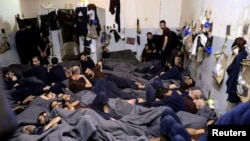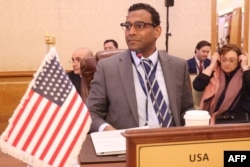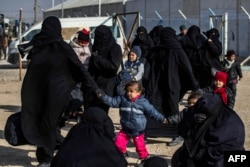The United States has renewed calls for countries to take back their nationals who have been held in detention camps and prisons in northeastern Syria.
Since the military defeat of the Islamic State terror group in 2019, thousands of foreign fighters and their families have been detained in several camps and prisons in areas under the control of the U.S.-backed Syrian Democratic Forces, or SDF.
While many countries have been taking back women and children affiliated with IS who are held in two detention centers in northeastern Syria, U.S. officials have urged them to repatriate more than 10,000 IS fighters, who are also held there.
"This is the largest concentration of detained terrorists anywhere in the world," said Ian Moss, deputy counterterrorism coordinator at the U.S. State Department.
He said IS continues to look for new opportunities to replenish its ranks by trying to free those detained fighters.
"If they escape, they will pose a threat, not only to northeast Syria, but they'll also pose a threat to the region and to our homelands," Moss said Wednesday during an event at the Washington Institute for Near East Policy. "The best way to prevent this is to repatriate these individuals so they can be rehabilitated, reintegrated, and, where appropriate, prosecuted."
More than 50,000 people, mostly women and children, from nearly 54 countries are currently held at al-Hol and Roj, two camps run by the Kurdish-led SDF. The 10,000 IS fighters are being held in more than a dozen prisons across northeastern Syria.
Syrian Kurdish officials say they cannot bear the responsibility of dealing with IS captives alone and that other countries should step in by taking back their citizens. They have also been calling for the establishment of a special tribunal inside Syria for those IS foreign fighters who have committed crimes in Syria.
Asked by VOA whether the U.S. would support such a tribunal in northeast Syria, Moss said the U.S. government believes that for those prisoners from third countries, their home nations have judicial systems that should be used to prosecute them.
"We're also looking at all options to include the possible prosecution of individuals in northeast Syria. But again, the institutions most capable of effectively prosecuting those cases are found elsewhere," he added.
According to U.S. officials, more than 3,000 individuals, mostly women and children, were repatriated last year to countries that include Albania, Barbados, Canada, France, Iraq, Kosovo, Kyrgyzstan, the Netherlands, Norway, Sudan, Spain and Slovakia. So far this year, at least 1,300 others have been repatriated to their home countries.
Moss said the U.S. anticipates that at least 25 countries this year will conduct around one repatriation operation from northeastern Syria.
Despite such efforts, experts say most countries have been reluctant to take back their citizens from Syria for domestic political and security reasons.
"But even in the best-case scenario, this is a time-consuming process because backgrounds need to be investigated and family members need to be tracked down and agree to act as guarantors," said Calvin Wilder, an analyst at the New Lines Institute for Strategy and Policy in Washington.
Wilder said the focus should be more on improving living conditions in al-Hol camp, which has witnessed a growing number of security incidents that have resulted in the deaths of many civilians.
"Repatriating citizens is a hard challenge with many different stakeholders, but increasing camp standards of living is far simpler for the United States to do unilaterally," he told VOA.
But Moss said the U.S. military, in partnership with the SDF, has been conducting operations against suspected IS operatives inside al-Hol "to reduce threats inside the camp, to give individuals inside the camp some space and to also give space for the provision of humanitarian assistance."
Americans repatriated
While it is not clear how many U.S. citizens are held in northeastern Syria, State Department official Moss said 39 individuals have been repatriated from there.
"That is certainly a priority for me and for my team and colleagues across the [State] Department," he said.
"We do everything we can to bring folks home, whether that's women and children, or other individuals who are in detention, whether they're known foreign terrorist fighters. We work with our interagency colleagues, as appropriate as they work to develop cases and potentially prosecute those individuals for whom they can bring charges against," Moss added.
The U.S. has prosecuted several IS members, but the most prominent prosecution involved El Shafee Elsheikh, a former British citizen, who – along with others in an IS cell known as "the Beatles" – was responsible for a hostage-taking that resulted in the deaths of four U.S. citizens, James Foley, Kayla Mueller, Steven Sotloff, and Peter Kassig, as well as British and Japanese nationals in Syria. Elsheikh was sentenced to life imprisonment in August 2022.
This story originated in VOA's Kurdish Service.



